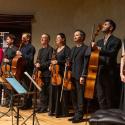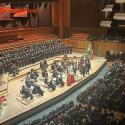Returning to the Wigmore Hall for another socially distanced concert, Edinburgh-born guitarist Sean Shibe brought a programme of moving, often melancholy music, apt for these still locked-down times. He opened with a trio of works by John Dowland written originally for lute. "Preludium" was delightfully intimate, Shibe expertly teasing out the subtleties of its emotion, while the descending chromaticism of "Forlorn Hope Fancy" was played with an almost jazzy sense; here Shibe toyed with the rhythm as he exposed the music’s crunchy discords. "Fantasia" began with a simply played melody which soon transformed into florid and evocative music, with each voice clearly illuminated.
Moving to Bach’s Prelude, Fugue, and Allegro in E flat major, Shibe played with a serene poise despite the highly intricate and complex work going on in the fingers, made possible to fully witness by the close camera angle. Though these pieces are commonly considered to be for lute, presenter Michael White tells us that though they may have been written for that instrument, it’s possible in Bach’s time they were also performed on a harpsichord or even a Lautenwerk – a sort of lute-harpsichord hybrid with gut strings, made in Europe during the Baroque period. Performing on acoustic guitar - the only instrument used throughout - Shibe gave the Prelude and Fugue a smooth, stately feel while the Allegro was nimbler and lighter.
Shibe performed britten's 'Nocturnal' with a real sense of insight and integritySkipping forward a few centuries, the "Habanera" from Thomas Ades’s 2016 opera The Exterminating Angel – which the composer has reworked into a solo concert piece – is a dark, richly textured work, with stark jumps between contrasting musical ideas. Some of that spikiness is still felt in Falla’s Homenaje pour Le Tombeau de Claude Debussy, though the serenity of Debussy’s music shone through. Moving on to music by another French impressionist, Poulenc's Sarabande, the only piece he wrote for solo guitar, was hauntingly contemplative.
Ending on a similar theme to its beginning, Shibe chose a work not by but inspired by John Dowland. Britten’s Nocturnal after John Dowland was fascinating both to watch and to listen to. Written in 1963, the piece is almost a back to front theme and variations on Dowland’s "Come Heavy Sleep", with each movement containing a bit of the original theme, but gradually coming closer to it as the piece moves on. Shibe performed this work with a real sense of insight and integrity, bringing his programme to a compelling close.














Add comment